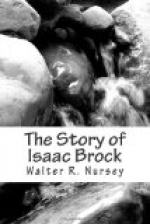The papers of surrender signed, Brock hastened to liberate Dean, a soldier of the 41st, wounded and taken prisoner at the Canard river, with another man, while gallantly defending the bridge against a large body of the enemy. In a voice broken with emotion Brock told him that he had “nobly upheld the traditions of the service and was an honour to his profession.” Then he singled out Lieutenant Roulette, of the sloop Hunter, a French Canadian, who captured eighteen prizes during the war and was the leading spirit in many gallant events. “I watched you during the action,” said the General. “You behaved like a lion. I will remember you.” In the orders of that afternoon Brock praised the conduct of his troops. He laid stress upon the “discipline and determination that had decided an enemy, infinitely more numerous in men and artillery, and protected by a strong fortification, to propose capitulation.”
The effect of the news in Upper Canada was electrical. Brock became the idol of the people and was acclaimed “hero and saviour of Upper Canada.” His performance was a record one. In nineteen days he had met the Legislature, settled important public business, transported a small army 300 miles, 200 of which was by open boat in stormy waters, compelled the surrender of an enemy three times his strength, entrenched in a protected fort, and seized 60,000 square miles of United States mainland and islands.
To the American people the news came as a thunder-clap. President Madison’s chagrin was indescribable. After all the insulting remarks and bombastic prophecies of himself and Clay, Calhoun, Eustis and others, the humiliation was as gall and wormwood. Clay, the apostate, later on swallowed his words and signed the treaty of peace. Eustis, the Secretary of War, had boasted that he would “take the whole country and ask no favours, for God has given us the power and the means.” But God saw fit to confound the despoiler. Hull was, of course, made a scapegoat. Tried by court-martial, he was found guilty of cowardice and neglect, and sentenced to death, but pardoned by the President. His son died fighting at Lundy’s Lane. The officers of Hull’s command, who were almost united in opposing surrender, as brave men felt their position keenly. Never let us forget that no one race holds a monopoly in courage, that no nation has exclusive control of the spirit of patriotism. Fortunate it is indeed for most of us that the loftier qualities of man can not be copyrighted by the individual. A share of these has been bestowed in wise proportion upon all members of the human family. To those who seek to emulate the character and deeds of the world’s famous men, certain essential qualities of mind may even be acquired and developed by all, but to possess the “fullness of perfection” cannot be the lot of every man.
Having finished “the business” that took him to Detroit, our hero did not waste an hour. Leaving Procter in command, he started before morning of the next day for Fort George, anxious to carry out his plans and assume the offensive on the Niagara frontier.




